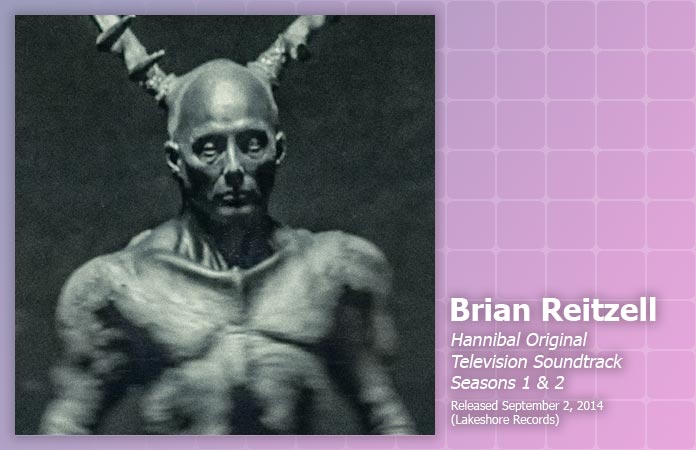Music Review: Brian Reitzell, Hannibal Original Television Soundtrack Seasons 1 & 2
Published on September 26th, 2014 in: Current Faves, Music, Music Reviews, Reviews, Soundtracks and Scores, TV |Fans of both Hannibal Lecter and Brian Reitzell will be thrilled by the recent release of nearly five hours of music from the soundtrack to what may become known as the most compelling interpretation of Thomas Harris’s iconic character, NBC’s Hannibal. With 27 tracks, one representing each episode from both seasons (and an extra track highlighting some of the music in Season 2’s killer finale), there is much to absorb here. Even those who have never seen the show, or who have perhaps avoided it because they can’t imagine anything living up to Anthony Hopkins’s cinematic portrayal, will be seduced by the exquisite sounds contained within this collection.
Show creator Bryan Fuller wanted the score for Hannibal to be “more psychological than melodic” and with Reitzell’s compositions, his wishes were granted. The dynamic range of the pieces contained within, particularly in the two volumes representing Season 1, varies from whispers in the darkness to short bursts of sustained horror. There are haunting melodies in “Entrée,” “Trou Normand,” and “Relevés,” but those bittersweet sounds are always accompanied by something more diabolical. Even the familiar, poignant piano motif is subjected to dread: there is always something evil lurking in the background, bleeding through to create an ongoing sense of unease if not outright fear. Will Graham’s “empathy” motif is there, too, although it doesn’t show up until the fifth track of Season 1.
Besides the music, Reitzell also contributes to the sound design of the show, which makes the soundtrack a thoroughly enveloping experience. Thematically, it’s on point, with many permutations of heartbeats, ticking clocks, and even footsteps laced throughout both volumes of Season 1. The unpredictability of what sounds like wind chimes gives a hint of what Season 2 will bring. What’s most remarkable about this achievement is how Reitzell doesn’t read the scripts before composing the music, relying only on Fuller’s emotional shorthand as a guideline.
As one might expect from the origin of the second season’s episode titles—a multi-course traditional Japanese dinner, Kaiseki—there is some Asian instrumentation found in Season 2’s selections, but it’s subtle. What differentiates Season 2’s soundtrack from the first is music that is even more unhinged, or at least music that becomes that way more quickly, with a cacophony of instruments that are perhaps being destroyed taking precedence over the comparatively sedate creepiness of Season 1. The first track of Season 2 even includes the unsettling, if not outright grotesque, “intubation” noise, and there are other tracks that feature unidentifiable yet scary noises (like the opening of “Tome-Wan”).
While there are instruments that are easily recognizable such as drums, violins, harpsichords, and clarinet, Reitzell also employs more obscure sounds, from the bullroarer to the wheelharp, as well as some custom-made items. There’s even a theremin, which is as uncanny as one might expect for an instrument that Hannibal himself plays in the show’s narrative.
Each track is named for an episode of the show, but the 27th track is titled “Bloodfest,” and it contains the music from the climax of the Season 2 finale. It’s far more restrained than those unfamiliar with the show might expect from such a title, sounding like the broken shards of glass that appear within one of the key scenes (not to mention the broken hearts that are implied).
Brian Reitzell has crafted an iconic soundtrack that perfectly mirrors what is currently the best show on television. If you haven’t yet succumbed to Hannibal, there’s no time like the present.
The Hannibal Original Television Soundtrack, Seasons 1 & 2 was released by Lakeshore Records on September 2. Season 2 of Hannibal was released on DVD and Blu-Ray by Lionsgate on September 9.

Time limit is exhausted. Please reload the CAPTCHA.